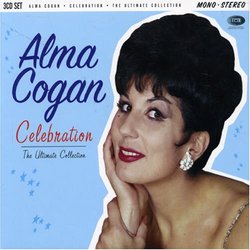Not quite ultimate but a great compilation
Peter Durward Harris | Leicester England | 05/27/2009
(5 out of 5 stars)
"Alma's music was slow to appear on CD, but when I discovered an 87-track triple CD (The A-Z of Alma, released in 1994 but long out of print now), I bought it. On closer inspection, it turned out to be a slightly strange compilation, omitting many of the obvious tracks but including plenty of great music nevertheless. I eventually found a single CD that contained all the obvious tracks and bought that too. Seeing this triple CD soon after its release in 2006, my first thought was that I probably didn't need it, but upon closer inspection I discovered that the first triple CD focused primarily on the fifties, as did the singles CD. This compilation contains a more even split, with slightly more than half the tracks dating from the sixties. Once I realized that, I bought it. There is a fair bit of duplication with what I already had, but enough to justify the price, which was much cheaper than The A-Z of Alma.
Alma had more British pop hits during the fifties than any other female singer of any nationality, but only four made the top ten although one of these made number one. During the fifties, the British pop music market wasn't as strong as it became in the sixties, in which decade Alma had only three minor British hits, the last of them in 1961. Doris Day, Rosemary Clooney and Joan Regan all had more British top ten hits than Alma during the fifties while Vera Lynn, Petula Clark and Connie Francis all matched Alma's total of four. Of these, Doris, Rosemary and Vera would have had more hits had charts started earlier than 1952, while Connie and Petula had plenty more hits in the sixties. So Alma's chart history isn't quite as brilliant as the liner notes suggest, but her music is brilliant anyway.
The first CD focuses on the fifties and includes most but not all of Alma's hits from that decade. It opens with the number one hit Dreamboat, but everything else on this CD appears to be in chronological order including Bell bottom blues (a cover of Teresa Brewer's American hit that gave Alma a UK top five hit), Little things mean a lot (which just missed the UK top ten despite Kitty Kallen's original becoming a UK number one hit), I can't tell a waltz from a tango (a cover of a Patty Page song that gave Alma a UK top five hit) and Never do a tango with an Eskimo (Alma's last UK top ten hit). This CD also includes covers of song that were huge hits for others, some of which were also minor hits for Alma, including Hernando's hideaway, Why do fools fall in love, Story of my life and Sugartime. The most notable omissions are Banjo's back in town and Go on by, both of which separately made the UK top twenty despite being opposite sides of the same single. Both tracks were included on the two other compilations that I've mentioned. The CD closes with Alma's cover of Blue skies.
The second CD focuses on the sixties, during which decade Alma remained popular in Britain but made little impact on the singles charts. There is no obvious explanation for this, because Alma adapted her style to reflect changing musical trends. Nevertheless, Alma was successful elsewhere, scoring a Japanese number one hit (Just couldn't resist her with her pocket transistor) and a huge Europe-wide hit with a song (The birds and the bees) that failed to chart in Britain. The CD opens with a song (Ja da) that was extensively used in a British TV commercial around the time that this compilation was released, and very likely provided the excuse for its release. How it came to be used in that commercial is a mystery, because it wasn't previously regarded as one of Alma's important songs. Dream of love (a minor 1960 hit) is included, but Cowboy Jimmy Joe (Alma's last UK hit in her lifetime, which charted in 1961) is omitted. Elsewhere on this CD, there are plenty of obscure but wonderful songs as well as covers of She's got you (Patsy Cline), Tell him (an American hit for the Exciters, but a UK hit for Billie Davis), I know (Barbara George), Trains and boats and planes (the Bacharach-David classic), Fly me to the moon (the oldie from the Great American Songbook) and Tennessee waltz (apparently the most-covered country song in the history of recorded music, though Alma's version definitely isn't country).
The third CD is titled standards and includes a mix of tracks from the fifties and sixties, but as the title suggest, there is no original material on this CD. However, there are plenty of obscure songs here although the first four are very famous. In 1965, Alma began work on an album of Beatles songs. Five tracks were recorded, of which four (Help!, I feel fine, Eight days a week, Ticket to ride) are included. The omitted track is Yesterday, but Alma's version of that song is easy to find elsewhere. I believe that Alma's version of Eight days a week was released as a UK single, which would explain why the Beatles version wasn't. While the Beatles had an American number one hit with it, nobody charted in the UK with Eight days a week. In any event, Alma never completed the intended album as her health deteriorated. She eventually died of cancer in 1967. The remainder of the CD mainly comprises songs the Great American Songbook.
This is not quite the ultimate Alma Cogan compilation but it comes very close to being that. If you enjoy listening to female pop singers of the fifties and sixties, you'll love Alma's music."


 Track Listings (25) - Disc #1
Track Listings (25) - Disc #1
